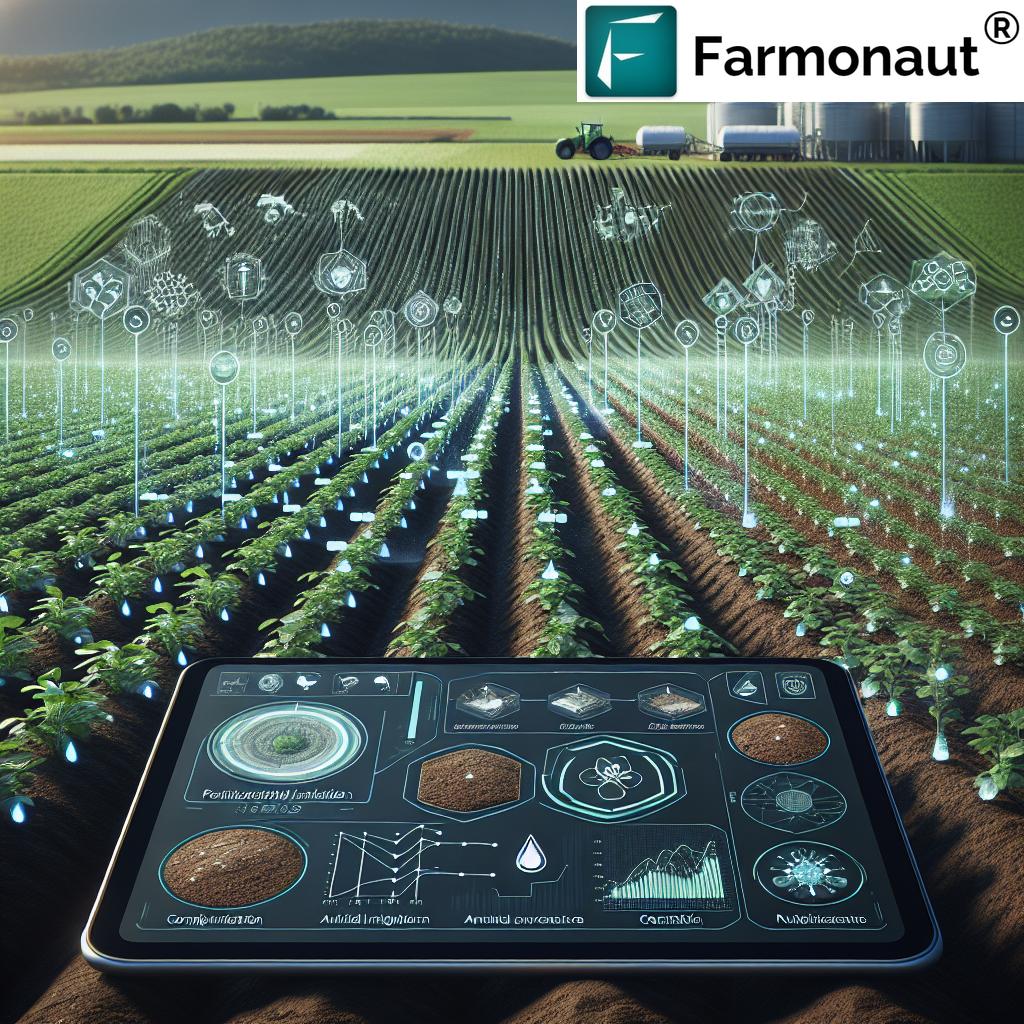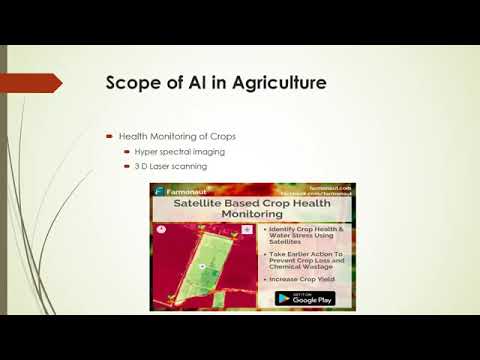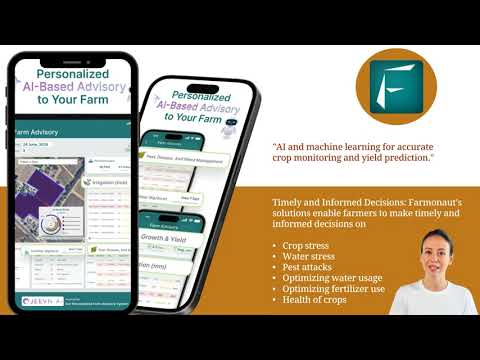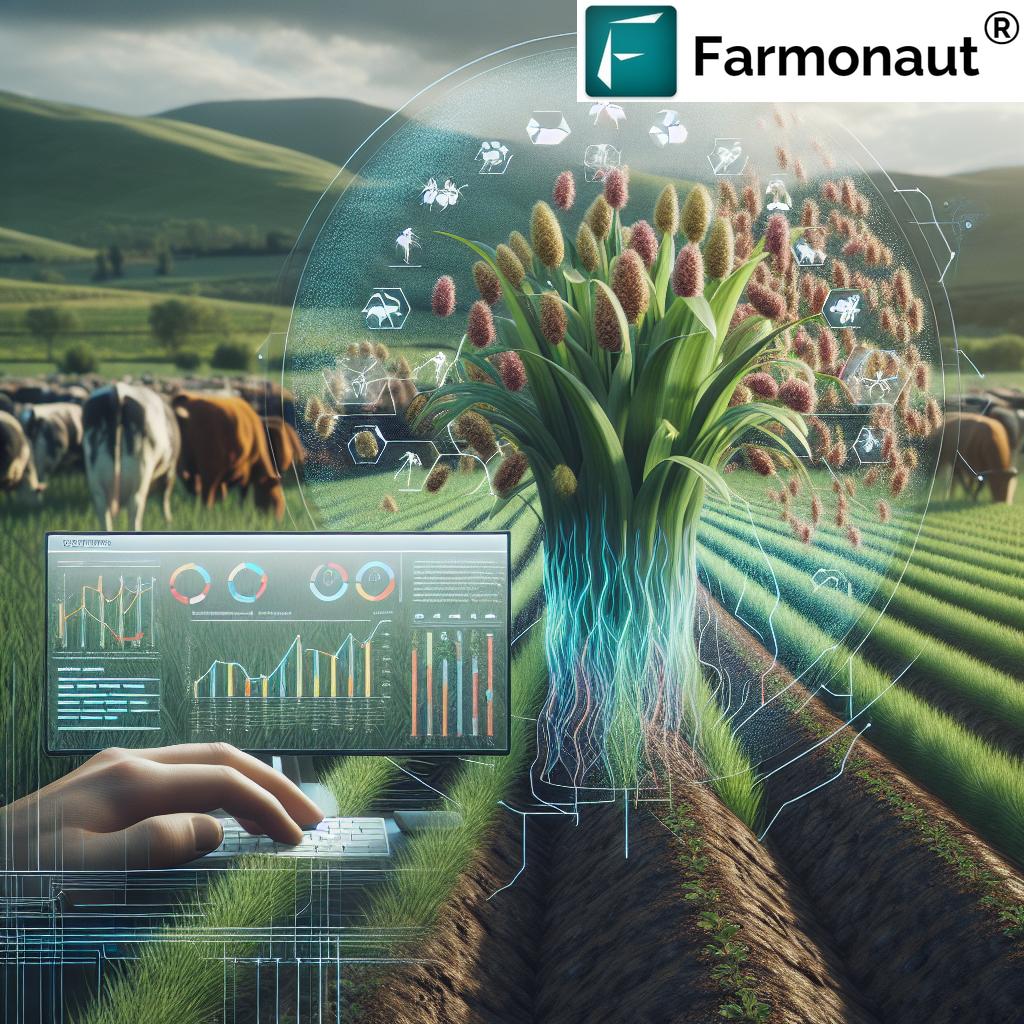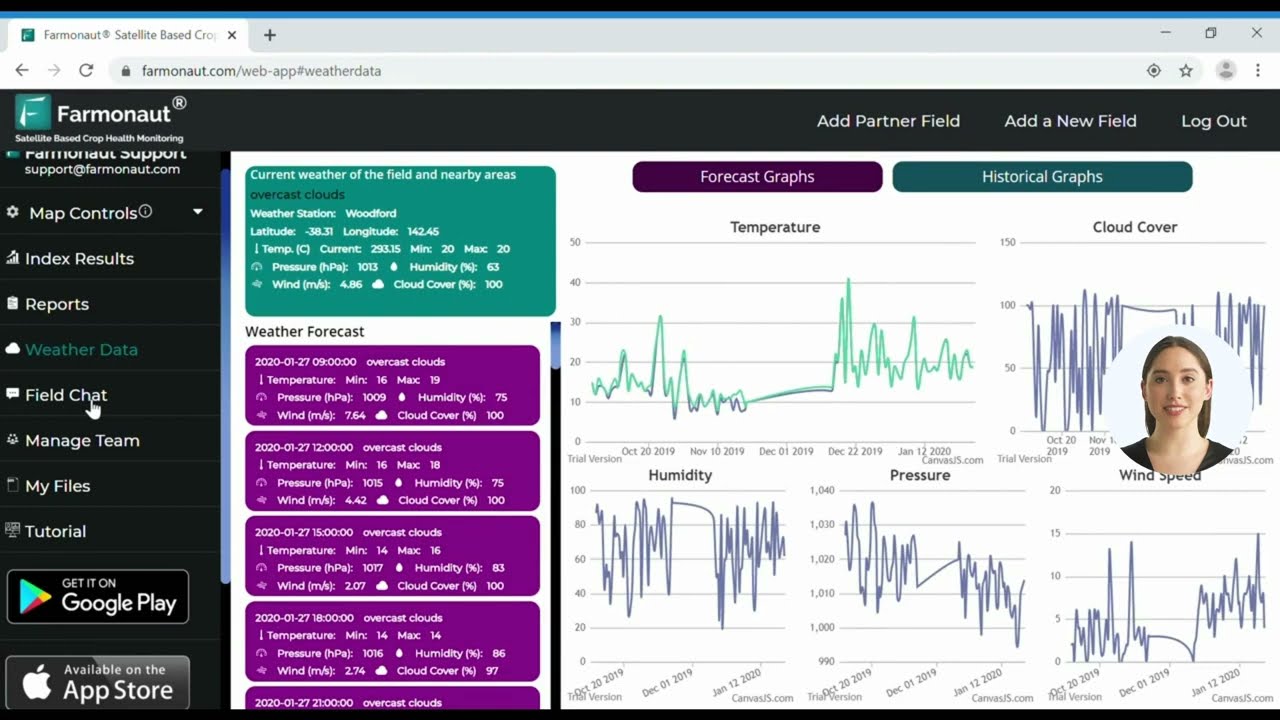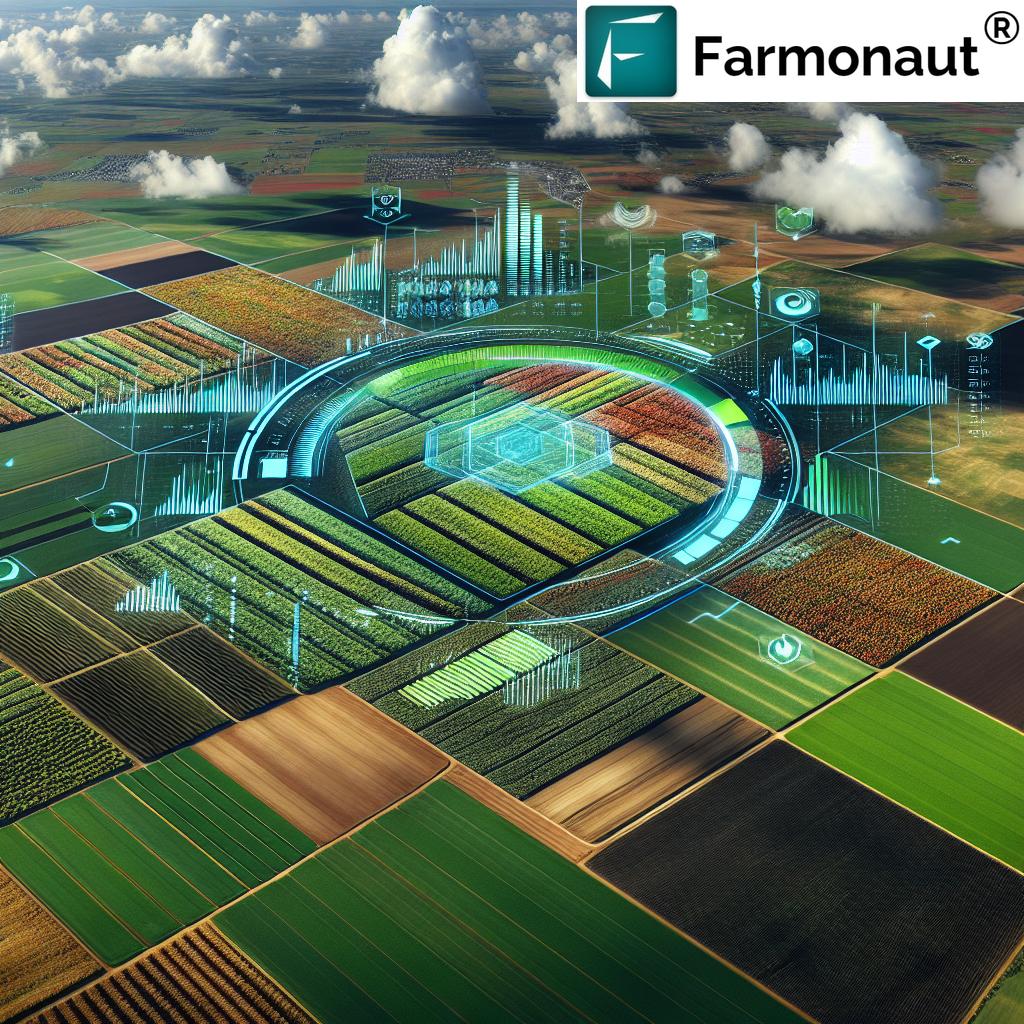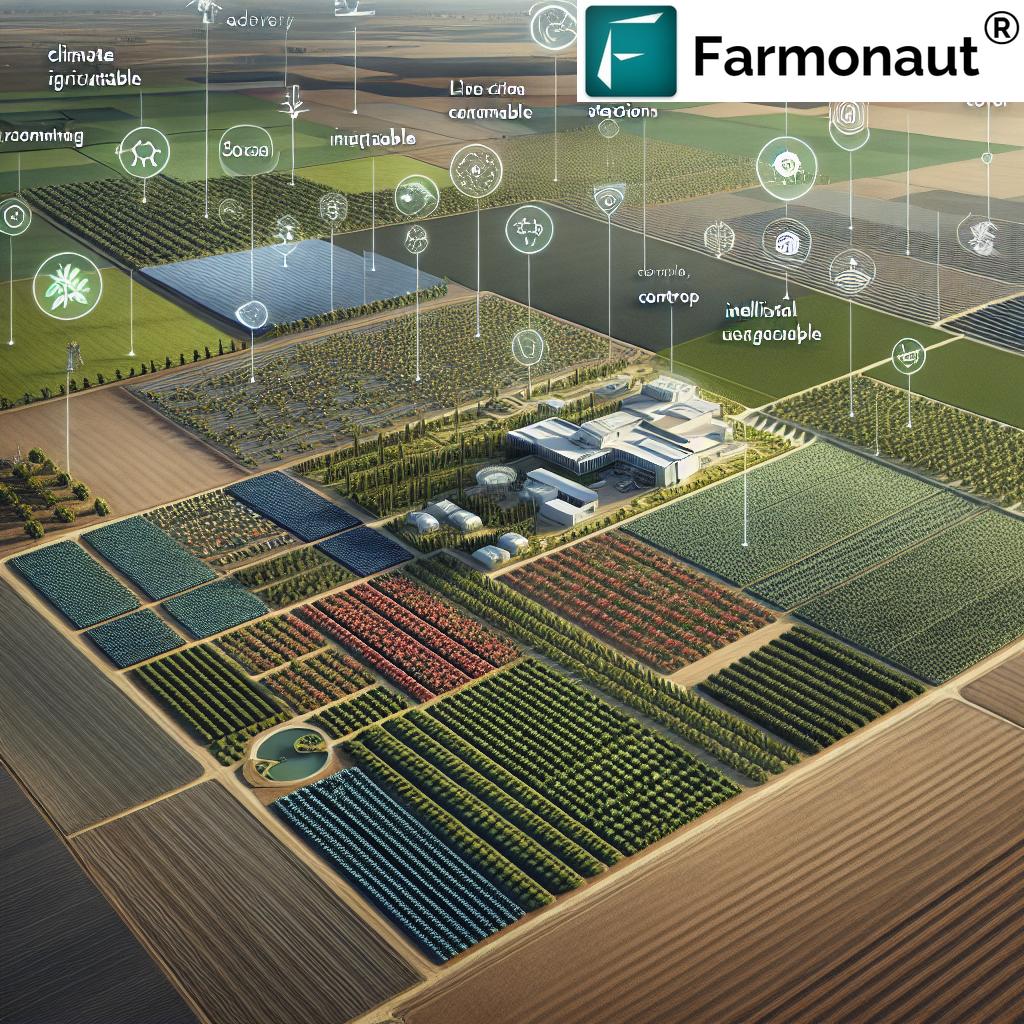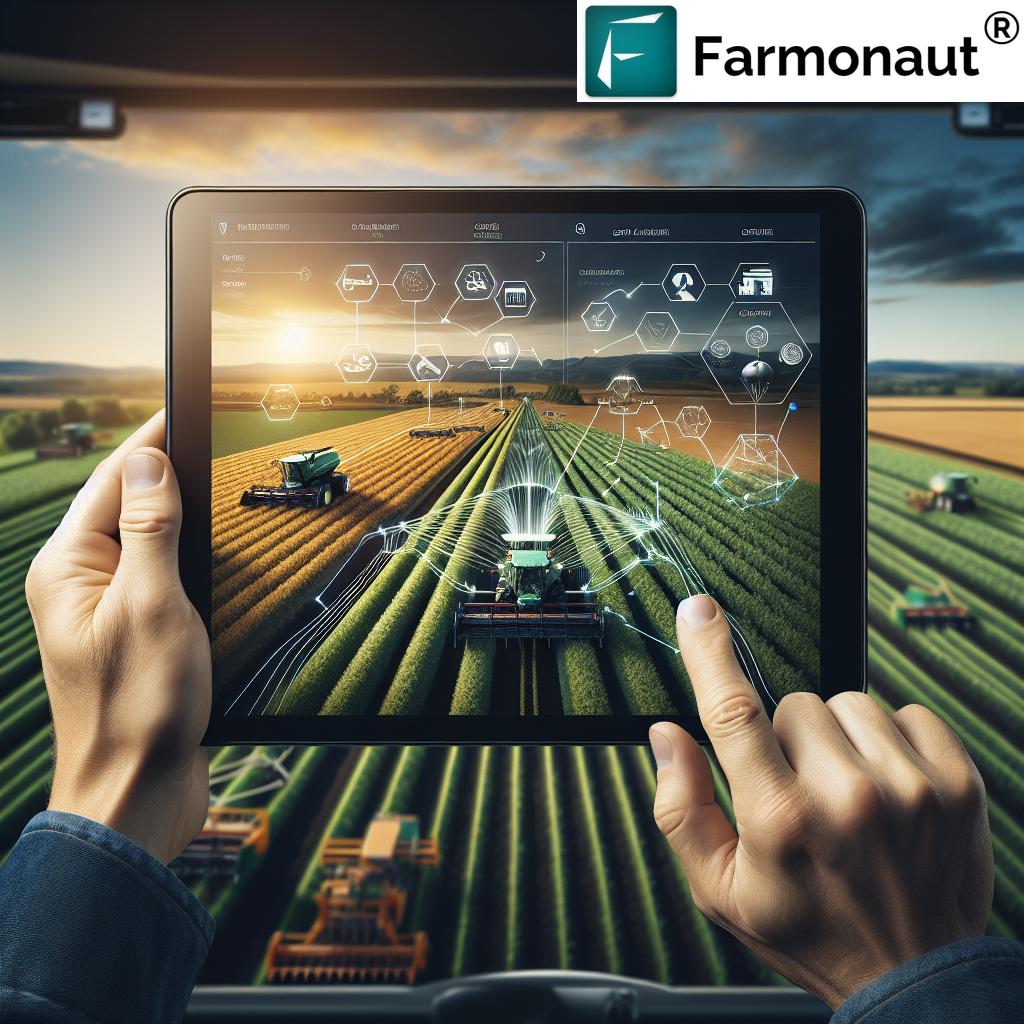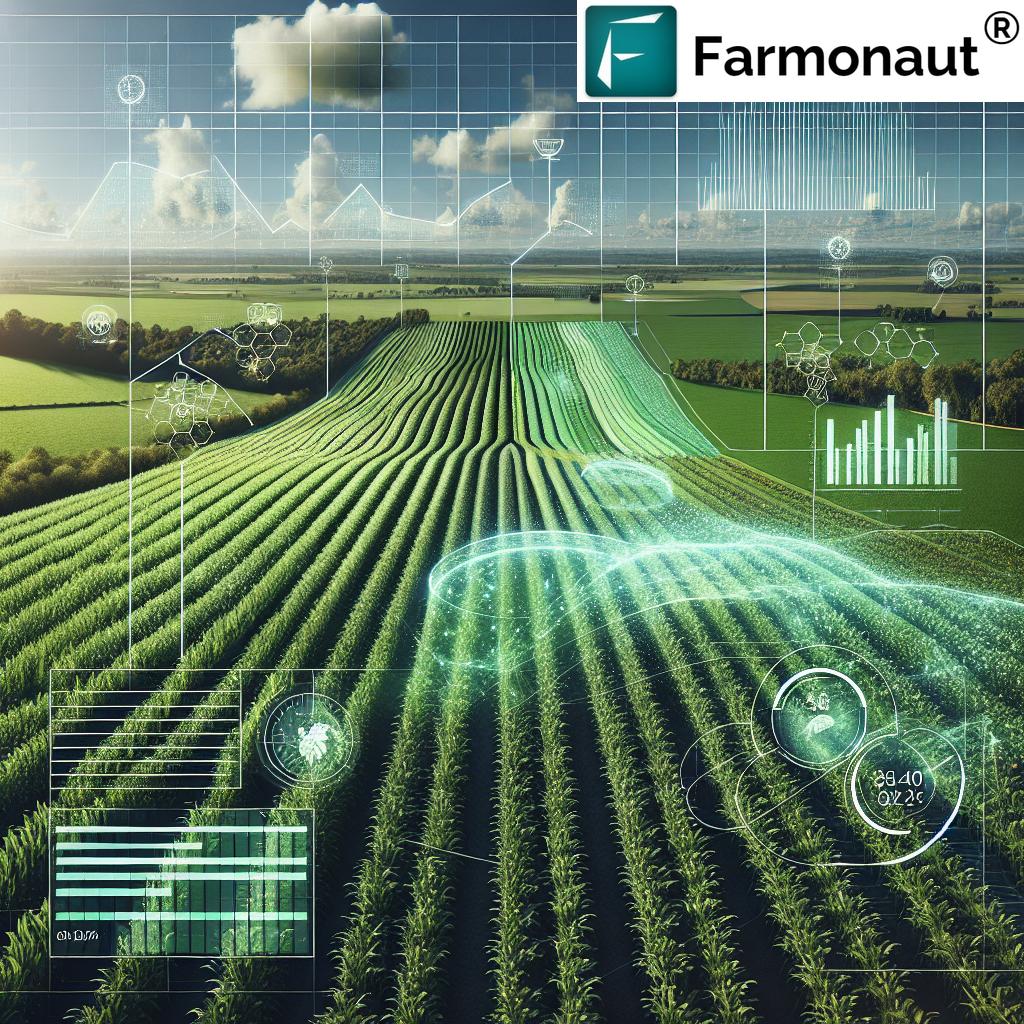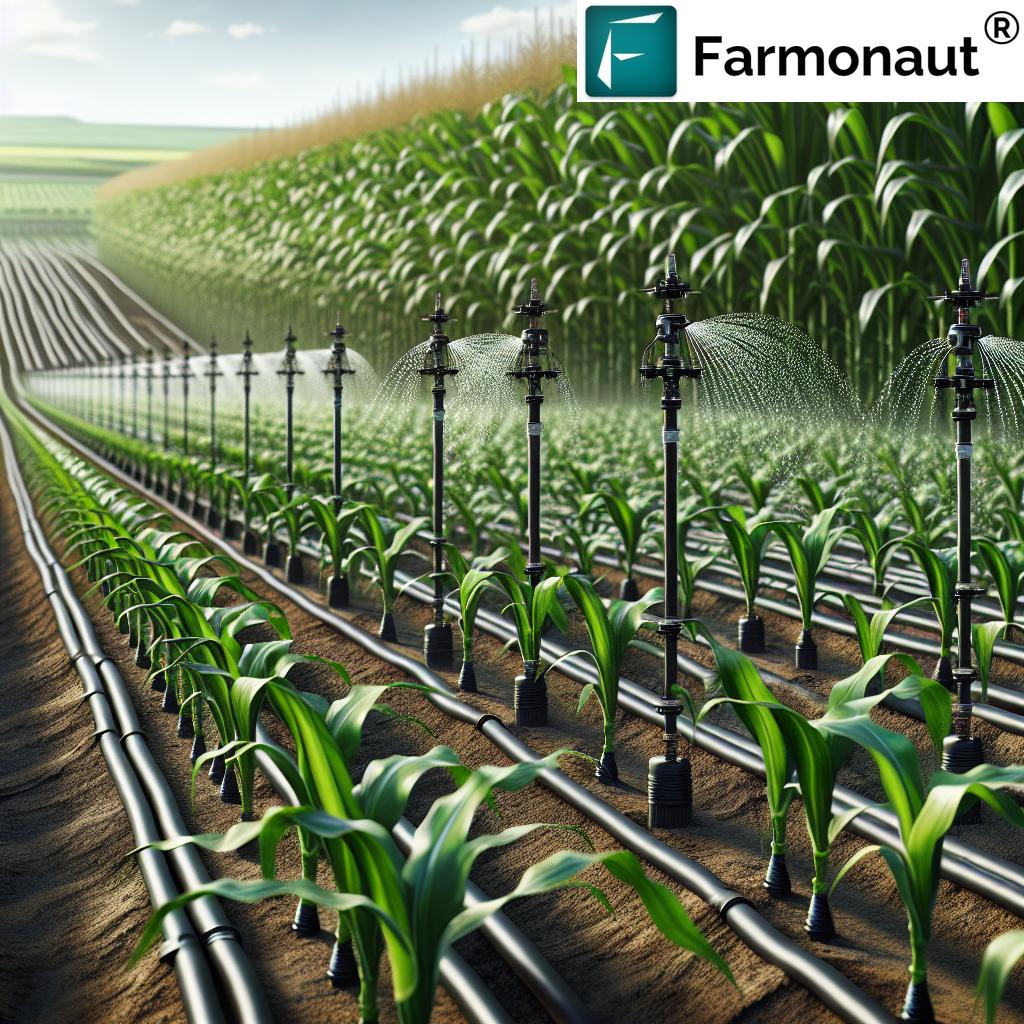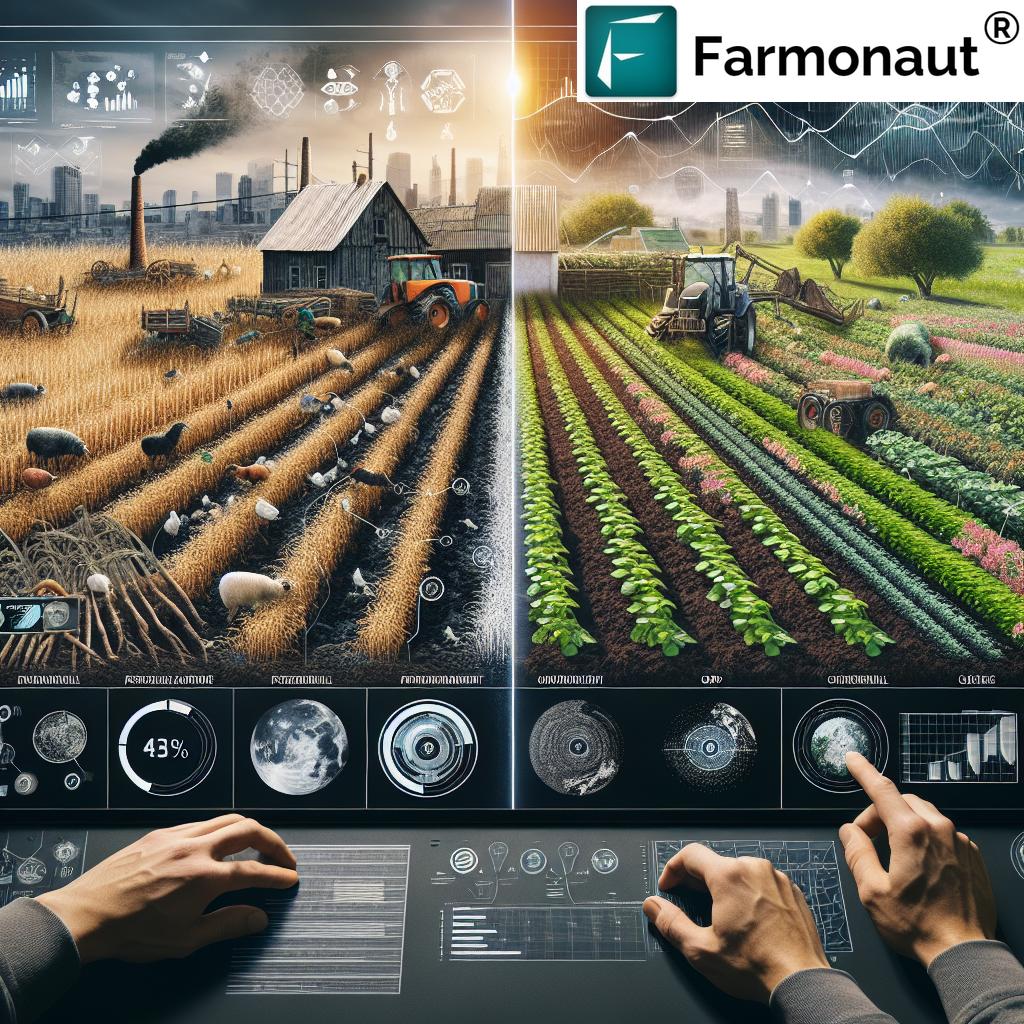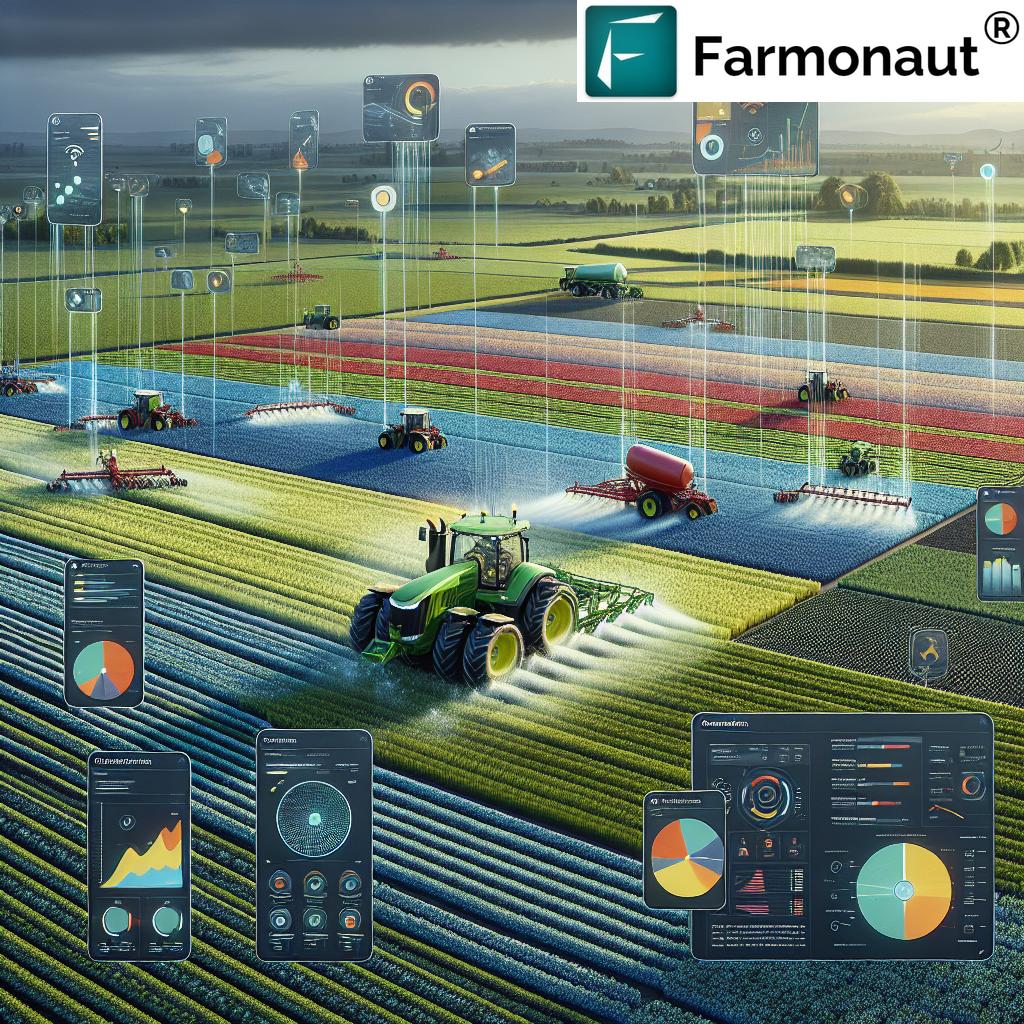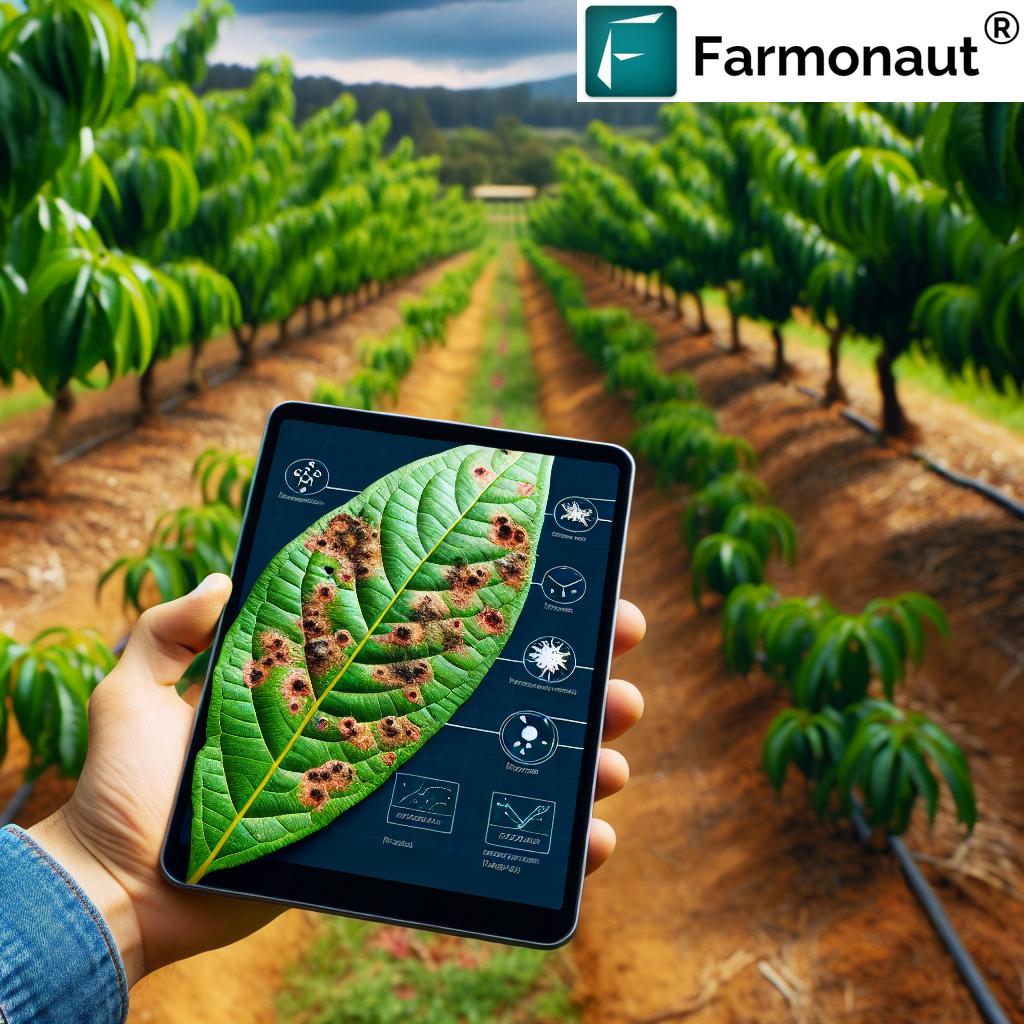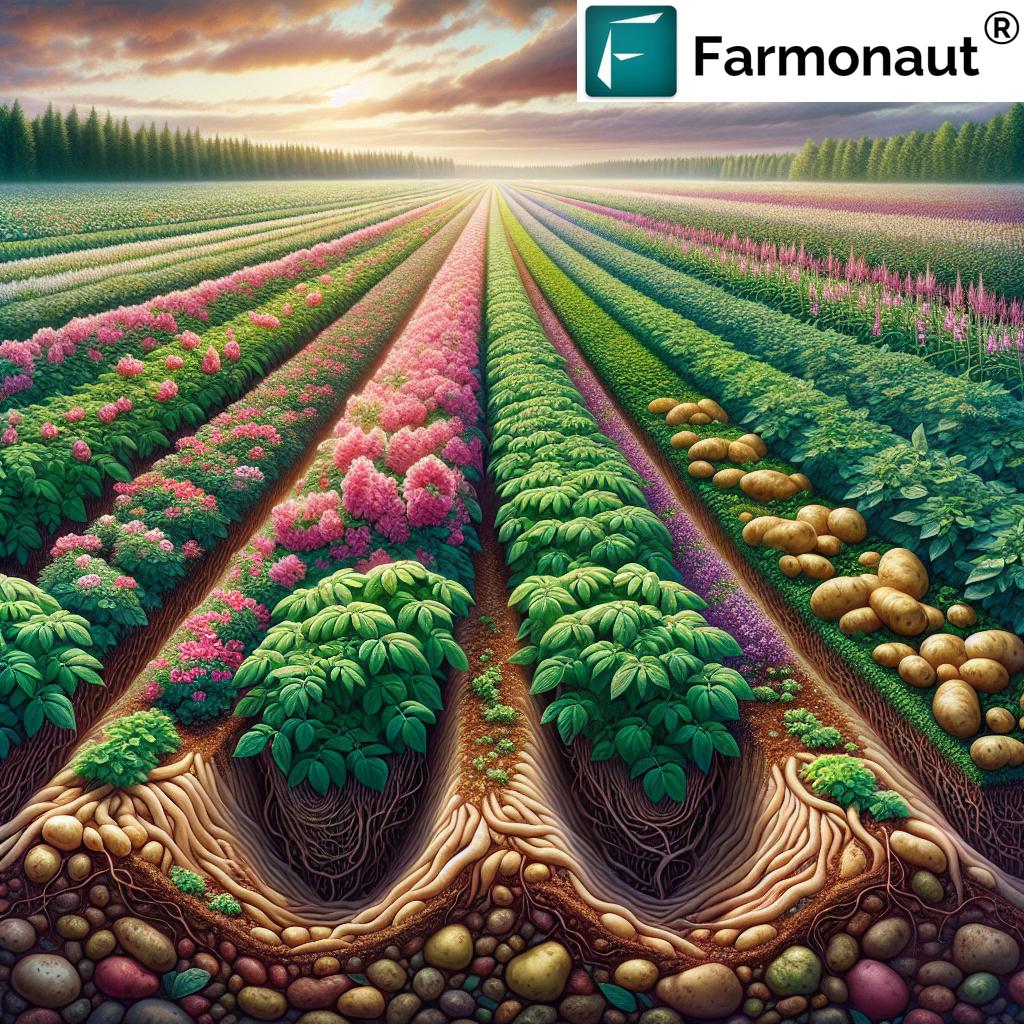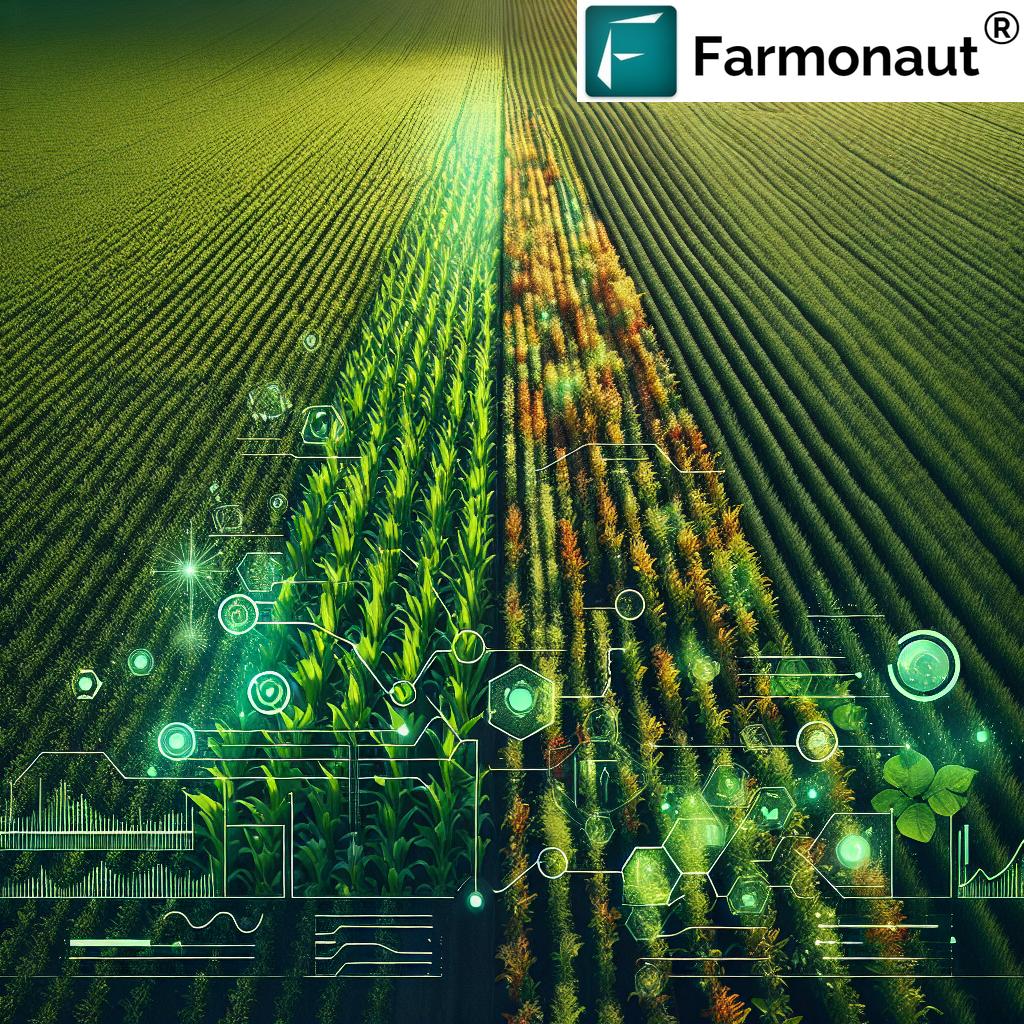Table of Contents
- Introduction
- 1. Precision Agriculture: AI at the Core of Field Management
- 2. Smart Irrigation Systems: Efficient & Sustainable Water Management
- 3. Automated Crop Monitoring with AI
- 4. Livestock Health Monitoring and Optimization
- 5. Agricultural Supply Chain Optimization with AI
- 6. Predictive Analytics in Farming & Climate Adaptation
- 7. AI for Pest and Disease Detection, Weed & Pest Control
- Data-Driven Farm Management: Empowering Informed Decisions
- Feature-Impact Comparison Table: AI Applications in Agriculture
- Farmonaut: Revolutionizing Precision Agriculture
- Challenges and Key Considerations
- Frequently Asked Questions (FAQ)
- Conclusion: The Future of AI-Driven Farm Management
“AI-driven precision agriculture can increase crop yields by up to 30% through optimized planting and resource allocation.”
AI-Driven Farm Management: 7 Powerful Ways to Boost Yields
AI in agriculture is no longer a vision of the future—it is reshaping the way we manage, cultivate, and sustain our land today. With climate pressures, water scarcity, rising input costs, and demand for sustainable farming practices increasing globally, leveraging innovative technologies has become critical. Artificial intelligence (AI) is at the epicenter of this transformation, unlocking new levels of efficiency, productivity, and environmental stewardship in agricultural management.
Summary: Artificial Intelligence (AI) is revolutionizing agriculture by introducing innovative solutions that enhance efficiency, sustainability, and productivity. AI-driven farm management encompasses a range of technologies and practices that empower farmers to make data-informed decisions, optimize resource use, and improve crop and livestock management. From precision agriculture and smart irrigation systems to data-driven insights, AI applications are boosting crop yields, ensuring resource conservation, and fostering sustainable agriculture worldwide.
On this journey, we explore the science and technology behind AI-driven farm management, unveiling the seven most powerful methods that empower farmers, agribusinesses, and organizations to overcome challenges and harvest more—from the same land—while supporting the planet.
Enhance your systems with Farmonaut’s Satellite and Weather Data API or see the developer docs for seamless integration.
1. Precision Agriculture: AI at the Core of Field Management
Precision agriculture stands as the foundation of AI in agriculture. It leverages advanced AI-powered data analytics to monitor and manage field variability in crops, enhancing both yields and sustainability. By analyzing data collected from satellites, drones, IoT devices, and in-field sensors, AI systems assess soil health, moisture levels, and nutrient content with remarkable accuracy. These technologies enable farmers to apply resources like water, fertilizers, and pesticides more efficiently and precisely, targeting only the areas that need intervention.
Precision Agriculture: How AI Analyzes Field Variability
- Field Monitoring: Utilizes machine learning algorithms and satellite imagery to track crop growth, soil variability, and plant health across expansive areas.
- Optimal Resource Allocation: Offers targeted recommendations, minimizing waste by suggesting the right amount of inputs at the right place and time.
- Yield Improvement: By integrating high-resolution, real-time data, AI allows for timely interventions that increase both crop quality and yield.
For example, AI-powered sensors are capable of detecting water stress in plants with up to 92% accuracy. This enables precise irrigation scheduling that conserves water, ensures optimal growth, and reduces production costs.
Satellite-Based Crop Health Monitoring with Farmonaut
At Farmonaut, we leverage multispectral satellite imagery to deliver comprehensive, actionable insights into vegetation health (NDVI), soil moisture levels, and nutrient content. Farmers can make data-driven decisions about irrigation, fertilizer application, and carbon footprinting, ensuring sustainable and cost-effective farm management. Our solutions contribute to significant yield optimization and resource conservation.
2. Smart Irrigation Systems: Efficient & Sustainable Water Management
“Smart irrigation systems powered by AI reduce water usage by up to 50% while maintaining or improving crop productivity.”
Water scarcity remains a looming challenge in agriculture, especially in arid regions. Smart irrigation systems harness AI to integrate weather forecasts, real-time soil moisture data, and crop requirements, automating watering schedules to ensure that crops receive exactly the amount of water they need—no more, no less. This approach conserves precious resources, reduces operational costs, and boosts sustainability.
Advantages of AI in Smart Irrigation
- Data-Driven Scheduling: AI systems analyze multiple data sources—soil sensors, satellite data, and weather models—to produce precise irrigation plans.
- Automated Operations: Integrating AI with IoT-enabled irrigation systems allows for remote control, ongoing monitoring, and continuous adjustment to changing field conditions.
- Optimal Resource Use: By only watering crops when needed, smart irrigation can reduce water consumption by up to 50% while maintaining crop health and yields.
Farmonaut’s Jeevn AI Advisory System provides real-time, satellite-informed insights on weather patterns and crop hydration needs. This empowers farmers—through our mobile and web apps—to proactively adjust their irrigation schedules for maximal water savings and yield optimization.
Farmonaut’s Crop, Plantation & Forest Advisory platform delivers personalized recommendations for smart irrigation and field management, integrating climate forecasting, NDVI, and precise moisture analysis for robust, sustainable results.
3. Automated Crop Monitoring with AI: Achieving Plant Health & Timely Interventions
Automated crop monitoring harnesses the power of AI-powered drones, sensors, and image recognition to deliver real-time assessments of crop conditions. These systems swiftly detect anomalies—ranging from nutrient deficiencies and pest infestations to early signs of diseases—enabling timely interventions before issues escalate and yields are compromised.
Key Benefits of AI-Powered Crop Monitoring
- High Resolution Analysis: Drones and satellites capture multispectral images for detailed crop health assessment.
- Automated Alerts: Farmers receive instant notifications about detected risks, letting them act proactively.
- Input Reduction: Precise targeting allows for minimized use of fertilizers and pesticides, improving sustainability.
For example, the implementation of AI-based pest detection systems has helped tested farms reduce pesticide use by 25%, demonstrating the value of targeted pest control measures.
Our satellite-driven crop monitoring tools on Farmonaut Apps provide granular, zone-wise data on stress zones, vegetation vigor, and plant health anomalies. These data-driven insights promote best crop management practices and safeguard profitability.
4. Livestock Health Monitoring and Optimization with AI
AI in agriculture is not limited to crops. Livestock health monitoring benefits significantly from AI-based wearables and biosensors that continuously track key parameters like animal movement, feeding patterns, body temperature, and stress indicators. Image recognition, powered by AI, identifies behavioral changes or early symptoms of illness, enabling proactive interventions and timely veterinary care.
Livestock Optimization: The Role of AI
- Early Detection: AI models analyze real-time animal data to spot illness or stress before it spreads.
- Feed Efficiency: AI-driven feeding systems optimize resource allocation, minimizing feed waste and reducing costs by up to 25%.
- Improved Welfare & Productivity: Timely actions driven by AI boost overall health, weight gain, and milk or meat yields.
For agribusinesses and livestock managers, these AI-powered applications translate into higher returns and greater sustainability.
Take traceability and quality control to the next level with Farmonaut’s Blockchain-Based Product Traceability Solution, offering secure transparency from animal rearing to product delivery.
5. Agricultural Supply Chain Optimization with AI
Amid global disruptions and demand fluctuations, agricultural supply chain optimization powered by AI has emerged as a game changer. By analyzing market trends, production capabilities, consumption patterns, and weather forecasts, AI systems deliver recommendations that streamline harvest schedules, logistics, and inventory management.
Supply Chain Advantages of AI-Driven Management
- Market Forecasting: Predicts demand and optimizes harvest timing to avoid market glut or shortage.
- Inventory Optimization: Minimizes waste by aligning storage and transport with real-time consumption trends.
- Resource Efficiency: Reduces logistics costs and ensures swift delivery to markets with intelligent routing.
- Economic Impact: It is estimated that the application of AI in agricultural supply chains can save worldwide farmers over $10 billion annually by 2030.
Our blockchain-based Product Traceability Platform enhances transparency at all stages from field to consumer, significantly reducing fraud and strengthening trust across agricultural operations.
6. Predictive Analytics in Farming & Climate Adaptation
Predictive analytics in farming uses AI to tap into large datasets, including historical records, weather data, and soil conditions, to forecast yields, resource needs, and climate risks. This capability is particularly critical in an era of unpredictable weather and evolving pest pressures.
Benefits of Predictive Analytics for Proactive Farm Management
- Yield Forecasting: AI models use past crop performance and current climate data to provide accurate yield estimates, improving market planning.
- Climate Adaptation: By identifying upcoming threats—like droughts or pest outbreaks—AI enables proactive adaptation strategies.
- Resource Optimization: AI recommendations optimize fertilizer, water, and labor allocation based on forecasted needs.
- Risk Mitigation: Detailed forecasting helps minimize the negative impact of extreme weather or disease outbreaks on productivity and profitability.
For example, AI-powered advisory software can detect the onset of droughts weeks in advance and recommend efficient irrigation management solutions—conserving water and protecting crop yields.
Farmonaut supports financial institutions with satellite-based crop verification for loans and insurance, leveraging predictive analytics to secure reliable, fast, and fraud-resistant agricultural financing.
7. AI for Pest and Disease Detection, Weed & Pest Control
AI for pest and disease detection brings automation and precision to crop protection. Using computer vision, drones, and advanced sensors, AI systems identify, locate, and quantify weeds, pests, and diseases with exceptional accuracy. This targeted approach reduces the need for broad-spectrum chemical applications, minimizing environmental impact while maintaining high crop yields.
How AI-Driven Weed & Pest Control Revolutionizes Crop Management
- Early Automated Detection: Machine learning and image recognition identify threats before they become detrimental.
- Targeted Control Measures: Site-specific interventions that minimize pesticide use but maximize effectiveness.
- Environmental Sustainability: Reduces chemical inputs, supporting sustainable and eco-friendly farming.
- Reduced Costs and Losses: Less chemical input lowers input costs and prevents production losses.
Our technologies at Farmonaut, powered by AI-driven analytics from satellite imagery, support disease and infestation mapping, advice on optimized pesticide dosing, and compliance with sustainability goals.
Data-Driven Farm Management: Empowering Informed Decisions
One of the greatest strengths of AI-driven agriculture lies in its capacity to transform complex data streams into clear, actionable insights. Data-driven farm management platforms analyze and integrate multisource data—ranging from weather patterns, soil data, crop health indices, to market signals—to generate recommendations and automate decision-making across the farm.
The Value of Data-Driven Insights for Farmers
- Comprehensive Integration: Merges inputs from drones, satellites, ground sensors, weather stations, and markets for holistic farm oversight.
- Actionable Recommendations: Provides specific, evidence-based guidance on irrigation, nutrition, crop selection, and harvest timing.
- Operational Automation: Supports end-to-end automation for fieldwork, supply chain, and inventory management.
- Continuous Learning: AI models improve over time as more data becomes available, refining future decision-making accuracy.
Farmonaut combines multispectral satellite-driven crop health monitoring, weather analytics, and personalized advisory through our Jeevn AI system, delivering end-to-end large-scale farm management solutions—from field to cloud—with real-time data at your fingertips.
“Smart irrigation systems powered by AI reduce water usage by up to 50% while maintaining or improving crop productivity.”
Feature-Impact Comparison Table: AI Applications in Agriculture
| AI Application | Core Technology Used | Estimated Yield Increase (%) | Efficiency Gains (%) | Sustainability Impact |
|---|---|---|---|---|
| Precision Agriculture | Satellite Imaging, IoT Sensors, Machine Learning | 15–30% | 20–40% | High |
| Smart Irrigation Systems | AI-Integrated Soil Moisture & Weather Sensors | 10–20% | 30–50% | High |
| Automated Crop Monitoring | Drones, Computer Vision, Image Processing | 8–16% | 15–35% | Medium–High |
| Livestock Health Monitoring | Wearable Biosensors, AI Pattern Analysis | 8–13% | 15–25% | Medium–High |
| Supply Chain Optimization | Predictive Analytics, Blockchain, Logistics AI | 5–12% | 10–28% | Medium |
| Predictive Analytics & Climate Adaptation | Big Data Analytics, Climate Modeling | 10–18% | 12–22% | High |
| AI-Driven Weed & Pest Control | Robotics, Computer Vision, AI Algorithms | 12–20% | 15–30% | High |
Farmonaut: Revolutionizing Precision Agriculture and Data-Driven Farm Management
At Farmonaut, we are committed to making precision agriculture accessible and affordable for farmers, agribusinesses, governments, and NGOs worldwide. Our platform unites satellite imagery, artificial intelligence, and blockchain in an easy-to-use web, mobile, and API-enabled system, delivering:
- Real-Time Satellite-Based Crop Health Monitoring
- AI-Based Farm Advisory (Jeevn AI)
- Blockchain-Enabled Traceability Solutions
- Fleet and Resource Management Tools
- Comprehensive Carbon Footprint Tracking
Whether you’re a smallholder, a plantation manager, or a policy maker, our solutions put data-driven farm management tools at your fingertips—without the need for expensive hardware.
For scalable, large-farm management, explore Farmonaut’s Large-Scale Farm Management Suite, ideal for plantations, cooperatives, and agri-enterprises seeking to harness the power of AI.
For Fleet Management, refer to our
Fleet Management Platform to track, utilize, and optimize agricultural machinery and logistics, lowering operational costs and maximizing efficiency.
We believe in empowering every user with transparent pricing and easy subscriptions:
Challenges and Key Considerations in AI-Driven Farm Management
While the promise of AI in agriculture is undeniable, adoption is not without challenges:
- Initial Investment: The deployment of advanced systems and subscriptions can be a barrier, especially for smallholder farmers.
- Data Privacy: Safeguarding personal and farm data is paramount as more information is collected and shared online.
- Technical Know-How: Effective use of AI-powered platforms requires training and upskilling, especially in rural communities.
- Integration with Legacy Practices: Successful results require careful planning to blend new technologies with traditional methods and infrastructure.
- Access: Ensuring all farmers and stakeholders can benefit equitably from AI advancements is key to broad, sustainable progress.
Addressing these challenges collectively—by using affordable platforms, focusing on user education, and supporting data transparency—will help realize the full potential of AI-driven farm management.
Frequently Asked Questions (FAQ)
-
What is AI-driven farm management?
AI-driven farm management refers to integrating artificial intelligence technologies into farming operations. It encompasses precision agriculture, smart irrigation, predictive analytics, and automated monitoring to optimize resource use, improve yields, and promote sustainability.
-
How does AI in agriculture help increase yields?
AI systems analyze data from diverse sources to optimize resource allocation, detect issues early, and provide timely recommendations—leading to higher crop output and reduced wastage.
-
Can smallholder farmers afford AI-driven solutions like Farmonaut?
Yes. Farmonaut’s satellite-based, subscription-driven model removes the need for costly hardware, making precision agriculture accessible and affordable to farms of every size.
-
What makes smart irrigation systems powered by AI so effective?
By integrating real-time weather, soil moisture, and crop data, AI irrigates only when and where needed. This can reduce water usage by up to 50% while maintaining or boosting crop productivity.
-
How does blockchain technology enhance traceability in agriculture?
Blockchain provides an immutable, transparent record of every stage from the farm to the consumer, reducing fraud, and increasing trust in food and fiber supply chains.
-
How can I get started with Farmonaut?
You can start instantly by registering on the Farmonaut Web, Android, or iOS Apps and begin monitoring your fields using our satellite-driven platforms.
-
Where can I integrate Farmonaut’s AI and data capabilities into my systems?
Explore Farmonaut’s Satellite and Weather Data API along with Developer Docs for easy, seamless integration into third-party or custom agri-tech solutions.
Conclusion: The Future of Sustainable, AI-Driven Agriculture
AI-driven farm management is transforming every facet of agriculture—from the way we monitor crops and schedule irrigation, to how we trace products and respond to climate risks. By integrating artificial intelligence and data-driven insights into daily operations, farmers everywhere are empowered to boost yields, optimize resource use, minimize costs, and practice more sustainable farming. As we continue this technological evolution, the promise of sustainable food security and resilient agriculture moves ever closer to reality.
Integrate advanced satellite analytics with your own agricultural platform. Discover Farmonaut’s Satellite & Weather API and check out our Developer Docs for details.
Keywords: AI, crop, data, management, agriculture, farmers, systems, water, pest, health, irrigation, productivity, livestock, efficiency, decisions, resource, analyzing, soil, costs, market, sustainability, practices, optimize, precision, crops, targeted, interventions, detect, smart, integrating, weather, approach, monitoring, infestations, control, farming, supply, chain, optimizing, agricultural, analytics, providing, challenges, enhance, farm, technologies, monitor, variability, sources, drones, moisture, nutrient, waste, yields, sensors, stress, schedules, ensures, conserving, sustainable, automated, diseases, recommend, timely, proactive, minimizes, detection, measures, applications, image, recognition, animal, patterns, feeding, models, analyze, early, optimization, feed, operations, trends, informed, predictive, climate, adaptation, forecast, identify, allocation, ensuring, chemical, insights, artificial, intelligence, solutions, improve, leverages, manage, field, satellites, iot, devices, assess, levels, content, information, plants, accuracy, precise, scheduling, conserves, optimal, growth, scarcity, challenge, address, issue, forecasts, requirements, automate, watering, receive, resources.





